 |
|
|
|
Welcome to the Invelos forums. Please read the forum
rules before posting.
Read access to our public forums is open to everyone. To post messages, a free
registration is required.
If you have an Invelos account, sign in to post.
|
|
|
|
|

 Invelos Forums->General: General Discussion
Invelos Forums->General: General Discussion |
Page:
1... 4 5 6 7 8  Previous Next Previous Next
|
|
Around the World in 86 Movies |
|
|
|
|
|
| Author |
Message |
| Registered: May 26, 2007 | Reputation:  |  Posts: 2,879 Posts: 2,879 |
| | Posted: | | | | Where We Are: Sweden wikipediaWhat We Watched: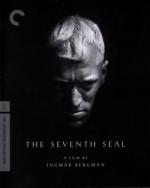 Det sjunde inseglet (The Seventh Seal) Det sjunde inseglet (The Seventh Seal)Year of Release: 1957 Directed By: Ingmar Bergman Starring: Max von Sydow, Gunnar Björnstrand, Nils Poppe, Bibi Andersson Genre: Drama Overview:Disillusioned and exhausted after a decade of battling in the Crusades, a knight (Max von Sydow) encounters Death on a desolate beach and challenges him to a fateful game of chess. Much studied, imitated, even parodied, but never outdone, The Seventh Seal ( Det sjunde inseglet), Ingmar Bergman's stunning allegory of man's search for meaning, was one of the benchmark imports of America's 1950s art-house heyday, pushing cinema's boundaries and ushering in a new era of moviegoing. My Thoughts:This is an art film - striking cinematography, arresting visuals, allegorical, philosophical, symbolic. It is also the art film, richly deserving of its status as classic. It's an extraordinary piece of art, a dark, beautiful film with great power to disturb the viewer. Steeped as it is in conflicts/contrast between faith and disbelief (the Christian knight and his atheist squire, the condemnation of the flagellants fanaticism and the simple beauty of Jof's vision of Mary and the Christ Child) I ultimately found the film to affirm the Wiccan adage "For if that which you seek, you find not within yourself, you will never find it without." The knight, seeking endlessly for answers, has the answer within himself the entire time - only you give your life meaning. Of course, perhaps Bergman means for us to each find our own message in the film. It's a rich, complex, layered piece of work and highly recommended for the thinking film enthusiast. A new favorite. Bechdel Test: Fail Overall: 5/5 | | | If more of us valued food and cheer and song above hoarded gold, it would be a merrier world.
-- Thorin Oakenshield | | | | Last edited: by Danae Cassandra |
| | Registered: May 26, 2007 | Reputation:  |  Posts: 2,879 Posts: 2,879 |
| | Posted: | | | | Where We're Going Next: Finland
Not much to choose from here. I have one set of 3 films. We've seen Shadows in Paradise, so it'll be one of the other two.
- Ariel
- The Match Factory Girl
- Shadows in Paradise | | | If more of us valued food and cheer and song above hoarded gold, it would be a merrier world.
-- Thorin Oakenshield |
| | Registered: May 26, 2007 | Reputation:  |  Posts: 2,879 Posts: 2,879 |
| | Posted: | | | | Where We Are: Finland wikipediaWhat We Watched: Ariel ArielYear of Release: 1988 Directed By: Aki Kaurismäki Starring: Turo Pajala, Susanna Haavisto, Matti Pellonpää Genre: Drama, Crime Overview:In Aki Kaurismäki's drolly existential crime drama, a coal miner named Taisto (Turo Pajala) attempts to leave behind a provincial life of inertia and economic despair, only to get into ever deeper trouble. Yet a minor-key romance with a hilariously dispassionate meter maid (Susanna Haavisto) might provide a light at the end of a very dark tunnel. Ariel, which boasts a terrific soundtrack of Finnish tango and Baltic pop music and lovely cinematography by Kaurismaki's longtime cameraman Timo Salminen, put its director on the international map. My Thoughts:When the system is stacked against an honest man, the only way to get ahead is to become a criminal himself. That's what I took away from this droll, deadpan look at the life of the working class. Taisto leaves his dying town after his father's suicide to seek something greater - only to find everything goes wrong except the relationship he develops with a divorced single mom. Yet Taisto never loses his calm, confident, detached demeanor, and never stops striving for a better life. Despite Taisto never losing hope, Kaurismäki's attitude seems world-weary and tinged with bitterness. His treatment of the working class is a dignified one, and he really captures the basically bleak future of the common man if he continues as the cog in the machine of society. The film itself is of a sparse, minimalist style and it has a great soundtrack. I enjoyed it quite a bit, but I could only recommend it for those who enjoy art films. Bechdel Test: Fail Overall: 3.5/5 | | | If more of us valued food and cheer and song above hoarded gold, it would be a merrier world.
-- Thorin Oakenshield |
| | Registered: May 26, 2007 | Reputation:  |  Posts: 2,879 Posts: 2,879 |
| | Posted: | | | | Where We're Going Next: The Soviet Union
I have a few films made in The Soviet Union from which to choose:
- Alexander Nevsky
- Andrei Rublev
- Battleship Potemkin
- Chess Fever
- Dersu Uzala
- Earth
- The End of St. Petersburg
- Ivan the Terrible (parts I & II)
- Letter Never Sent
- Man With a Movie Camera
- The Mirror
- Solaris
- Stalker
- Strike
We've previously seen Battleship Potemkin and Solaris, and will likely be watching Man With a Movie Camera, as I really want to see that one. | | | If more of us valued food and cheer and song above hoarded gold, it would be a merrier world.
-- Thorin Oakenshield |
| | Registered: May 26, 2007 | Reputation:  |  Posts: 2,879 Posts: 2,879 |
| | Posted: | | | | Where We Are: The Soviet Union wikipediaWhat We Watched: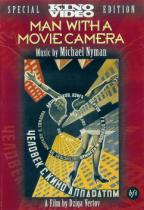 Chelovek s kino-apparatom (Man With a Movie Camera) Chelovek s kino-apparatom (Man With a Movie Camera)Year of Release: 1929 Directed By: Dziga Vertov Starring: The people of Moscow and Odessa Genre: Documentary Overview:Dziga Vertov's MAN WITH A MOVIE CAMERA is considered one of the most innovative and influential films of the silent era. Startlingly modern, this film utilizes a groundbreaking style of rapid editing and incorporates innumerable other cinematic effects to create a work of amazing power and energy. After his work on The Commissar Vanishes, a multi-media art event in 1999, composer Michael Nyman ( The Piano) continued researching the period of extraordinary creativity that followed the Russian Revolution. His artistic inquiry resulted in a new, celebrated score for MAN WITH A MOVIE CAMERA, performed by The Michael Nyman Band on May 17, 2002 at London's Royal Festival Hall. This dawn-to-dusk view of the Soviet Union offers a montage of urban Russian life, showing the people of the city at work and at play, and the machines that endlessly whirl to keep the metropolis alive. It was Vertov's first full-length film, and it employs all the cinematic techniques at the director's disposal—dissolves, split-screens, slow motion and freeze frames—to produce a work that is exhilarating and intellectually brilliant. My Thoughts:First, the obvious disclaimer. This is a non-linear, non-narrative, experimental film. The average movie-goer would likely be either confused or bored, or both, by this film. I can't think of one of my friends to share this film with. That having been said, this is one of the most innovative, interesting films to watch. There are dozens upon hundreds of modern films that don't have even one tenth of the creativity demonstrated here. The camera work and editing are simply amazing. Jumps, stops, split-screen, frenetic movement, trick work, every little technique is used to create a look at the Russian people at work and play. There are a lot of reasons to watch this film - for its innovative camera work, for its place in cinema history, for its view of everyday life in 1929 Russia, for a look at a successful style of propaganda film. This is, after all, a celebration of the working class, an everyman's picture. There are no stars but the people themselves, and the magical world of the cinema is the world of the worker, of society, working together in harmony. I'd say it's absolutely essential viewing for cinema enthusiasts, recommended for art film lovers, but blockbuster lovers should skip it. I found it a dazzling piece of work and enjoyed it quite a lot. Bechdel Test: not applicable Overall: 4/5 | | | If more of us valued food and cheer and song above hoarded gold, it would be a merrier world.
-- Thorin Oakenshield |
| | Registered: May 26, 2007 | Reputation:  |  Posts: 2,879 Posts: 2,879 |
| | Posted: | | | | Where We're Going Next: Russia
We're kinda staying put, since Mom has voted to watch the Russian film next rather than saving Russia for when we're in Asia.
We have the following films from Russia:
- The Cuckoo
- Day Watch
- The Italian
- Night Watch
- Prisoner of the Mountains
- Roads to Koktebel
Mom wants to watch The Cuckoo, so that's what we'll be watching. | | | If more of us valued food and cheer and song above hoarded gold, it would be a merrier world.
-- Thorin Oakenshield |
| | Registered: March 19, 2007 | Reputation:  |  Posts: 6,018 Posts: 6,018 |
| | Posted: | | | | Hi Danae, I hope you're still enjoying your cinematic world tour!  I really enjoy reading your reviews, and I fully share your views on Chelovek s kino-apparatom (Man With a Movie Camera). Watched it myself quite recently. The Cuckoo is great - I think you'll enjoy it. If I may make one recommendation for a Russian film not in your collection yet: Russian Ark. The whole film was shot in the Hermitage Museum in St. Petersburg in a single take, involving close to 3,000 actors and extras in full costume to portray Russian historical figures. Enjoy! DJ | | | | Last edited: by dee1959jay |
| | Registered: May 26, 2007 | Reputation:  |  Posts: 2,879 Posts: 2,879 |
| | Posted: | | | | That sounds really interesting. I think I may have to pick that up. Thanks!  And, yes, we are still enjoying our cinematic world tour. We're not moving as fast as I'd like, but that's more time constraint than anything. | | | If more of us valued food and cheer and song above hoarded gold, it would be a merrier world.
-- Thorin Oakenshield | | | | Last edited: by Danae Cassandra |
| | Registered: May 26, 2007 | Reputation:  |  Posts: 2,879 Posts: 2,879 |
| | Posted: | | | | Where We Are: Russia wikipediaWhat We Watched: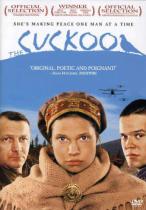 Kukushka (The Cuckoo) Kukushka (The Cuckoo)Year of Release: 2002 Directed By: Aleksandr Rogozhkin Starring: Anni-Kristiina Juuso, Viktor Bychkov, Ville Haapasalo Genres: Drama, Comedy, War Overview:September 1944, in a land torn apart by war, a Finnish sniper is labeled a coward by his compatriots; as punishment, he is nailed to a rock and left to his own devices. Not long after, a disgraced Russian Captain, en route to his court martial, is injured in an accident. Both men are about to find out how they have one thing in common. Wounded and emotionally tortured, they are taken in by Anni, a young, resourceful war widow, who offers shelter to one while nursing the other back to health. None of them understands the others' languages, but it doesn't seem to matter. Isolated, the three unlikely roommates - a Finn, a Russian and a Lapp - overcome both comic and tragic misunderstandings to form a passionate three-way...relationship. Because after a day of hard work on Anni's farm, who needs words? My Thoughts:I must say, I'm glad Mom insisted we watch this one out of our Russian films. We really enjoyed this film. It has a stark kind of beauty to it, especially the landscape once the focus gets to Anni's farm by the lake. It's also a powerful anti-war film. In the featurette on the making of the film, Haapasalo talks about how once you get to know someone you can't go to war against them, for you see them as a human being just like yourself. The film has the same message, in the eventual friendship between Ivan and Veikko. That friendship, and their mutual friendships with Anni, however, are only so deep. Though they find a way to communicate without language, and do come to understand each other to a certain degree, their relationships would have been much deeper and much stronger than they became. The film really emphasized to me the fundamental importance of language in human relationships. The language barrier led to several very humourous parts of the film, especially the sequence between Ivan and Anni about the mushrooms, but it was also the biggest tragedy between all of them. Of course, had they been able to communicate we might not have gotten another valuable point the film tries to make - that one should not judge someone so quickly. Ivan believes Veikko to be a fascist, when Veikko is trying to tell him that the war is over for him and all he wants is to go home and live in peace. Ultimately, this is a film that promotes the idea that love, friendship, pleasure, and life are really what is important and what are really worth striving for. The only thing I wasn't happy with was the ending. Spoiler: (Select to view)I really wanted them to stay with Anni, and I think they would have if they had known she was pregnant I think I understand why the director chose to end it as he did though. A wonderful film, though, and recommended. Bechdel Test: Fail Overall: 3.75/5 | | | If more of us valued food and cheer and song above hoarded gold, it would be a merrier world.
-- Thorin Oakenshield | | | | Last edited: by Danae Cassandra |
| | Registered: May 26, 2007 | Reputation:  |  Posts: 2,879 Posts: 2,879 |
| | Posted: | | | | Where We're Going Next Estonia ... or Poland
We should be going to Estonia. We have one film from there - Sugisball - so that's what we'll be watching. But we won't have time for it until at least next Sunday.
So we might jump countries and go to Poland, and return to Estonia later. I have two films from Poland - The Double Life of Veronique and Knife in the Water, and both are shorter than Sugisball, so there might be time to watch one of them before Sunday. | | | If more of us valued food and cheer and song above hoarded gold, it would be a merrier world.
-- Thorin Oakenshield |
| | Registered: May 26, 2007 | Reputation:  |  Posts: 2,879 Posts: 2,879 |
| | Posted: | | | | Where We Are: Poland wikipediaWhat We Watched: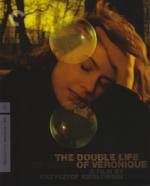 Podwójne zycie Weroniki / La double vie de Véronique (The Double Life of Veronique) Podwójne zycie Weroniki / La double vie de Véronique (The Double Life of Veronique)Year of Release: 1991 Directed By: Krzysztof Kieslowski Starring: Irène Jacob, Halina Gryglaszewska, Jerzy Gudejko, Philippe Volter, Claude Duneton Genre: Drama, Romance Overview:Krzysztof Kieslowski's international breakthrough remains one of his most beloved films, a ravishing, mysterious rumination on identity, love, and human intuition. Irène Jacob is incandescent as both Weronika, a Polish choir soprano, and her double, Véronique, a French music teacher. Though unknown to each other, the two women share an enigmatic, emotional bond, which Kieslowski details in gorgeous reflections, colors, and movements. Aided by Slawomir Idziak's shimmering cinematography and Zbigniew Preisner's haunting, operatic score, Kieslowski creates one of cinema's most purely metaphysical works. The Double Life of Véronique is an unforgettable symphony of feeling. My Thoughts:This is a lyrical, rich, beautiful film about the interconnectioness of human beings. I must agree with Roger Ebert, this is one of the most beautifully filmed movies I have seen. The cinematography, lighting, color, are all exquisite. Kieslowski himself said the film is about "the inner life of a human being" and that's as good a description as any. This is poetry, if poetry is visual. It's moody, atmospheric and hypnotic. It draws you in, like any great work of art. It's a dream, a story about the soul of a woman, of two women, of all of us. Irène Jacob does a spectacular job as Veronique/Weronika. She basically has to carry the entire film and does it splendidly, pulling off two distinct people who must also be the same person. No wonder she was honored at Cannes for this film. Of course, it should go without saying after that paragraph that this is strictly for the art-house crowd. Blockbuster fans should steer clear, you'll find it much too slow and opaque. Bechdel Test: Pass Overall: 4.5/5 | | | If more of us valued food and cheer and song above hoarded gold, it would be a merrier world.
-- Thorin Oakenshield | | | | Last edited: by Danae Cassandra |
| | Registered: May 26, 2007 | Reputation:  |  Posts: 2,879 Posts: 2,879 |
| | Posted: | | | | Where We're Going Next:
We should go back to Estonia for Sugisball but we had greater success in watching films when we were going through Africa by jumping around rather than sticking to a set order, so I think we're going to go back to jumping.
So, next up, East Germany!
We have three films from East Germany:
- The Murderers Are Among Us
- The Rabbit Is Me
- The Second Track | | | If more of us valued food and cheer and song above hoarded gold, it would be a merrier world.
-- Thorin Oakenshield |
| | Registered: May 26, 2007 | Reputation:  |  Posts: 2,879 Posts: 2,879 |
| | Posted: | | | | Where We Are: East Germany wikipediaWhat We Watched: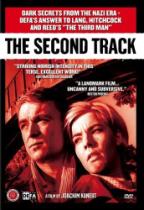 Das zweite Gleis Das zweite GleisYear of Release: 1962 Directed By: Joachim Kunert Starring: Albert Hetterle, Annekathrin Bürger, Horst Jonischkan, Walter Richter-Reinick Genre: Suspense/Thriller, Film Noir Overview:Filmed in menacing black and white, this rare noir classic from the legendary DEFA Film Studios is the East German answer to Fritz Lang, Alfred Hitchcock and Carol Reed's The Third Man. A train station inspector witnesses a robbery, and recognizes one of the thieves - but hides this fact from the authorities. Meanwhile the thief sets his partner after the inspector's daughter, setting in motion an explosive unearthing of dark secrets from the Nazi era. My Thoughts:This is a tightly scripted little film noir mystery. The mystery isn't the usual sort, like a murder or crime, but the mystery of secrets and the past. Why would a man not identify a man he recognizes as a thief? What is he hiding, and why? The film keeps you on the edge, wondering what it is until the reveal, though knowing the background and the years gives one a suspicion of what might be involved. This is a thought-provoking film, and a film that wrestles with guilt - both the guilt of the individual and society, of what is done and what is not done, and how we cannot escape our guilt by burying it with lies. Truth needs the light of day to conquer guilt. Beautifully filmed in black and white, with excellent use of light and shadow, and with an eerie, dissonant soundtrack, Das zweite Gleis stands up nicely with the best film noir, and is recommended for any fans of the genre. Bechdel Test: Pass Overall: 4/5 | | | If more of us valued food and cheer and song above hoarded gold, it would be a merrier world.
-- Thorin Oakenshield | | | | Last edited: by Danae Cassandra |
| | Registered: May 26, 2007 | Reputation:  |  Posts: 2,879 Posts: 2,879 |
| | Posted: | | | | Where We're Going Next: Reunified Germany
I think we'll stay in Germany for a bit, and watch a film made since Germany was reunified, so since 1990.
So, here's the list, which includes only films made exclusively in Germany (eliminating co-productions):
- Cherry Blossoms
- Downfall
- The Edukators
- Europa Europa
- Good Bye Lenin!
- House of the Sleeping Beauties
- King of Thieves
- The Lives of Others
- Mostly Martha
- Nowhere in Africa
- The Raspberry Reich
- Rosenstrasse
- Run Lola Run
- Schultze Gets the Blues
- Sophie Scholl
- Storm
- Valkyrie
We've seen Mostly Martha and Schultz Gets the Blues (both are good), so we'll watch one of the others. I'm thinking it's going to be Run Lola Run. | | | If more of us valued food and cheer and song above hoarded gold, it would be a merrier world.
-- Thorin Oakenshield |
| | Registered: March 19, 2007 | Reputation:  |  Posts: 6,018 Posts: 6,018 |
| | Posted: | | | | Lola rennt is good, too, as are plenty of others on your list. Enjoy! |
| | Registered: March 31, 2007 |  Posts: 662 Posts: 662 |
| | Posted: | | | | I would recommend Downfall (Der Untergang), The Lives of Others (Das Leben der Anderen) and Sophie Scholl. | | |  |
|
|

 Invelos Forums->General: General Discussion
Invelos Forums->General: General Discussion |
Page:
1... 4 5 6 7 8  Previous Next Previous Next
|
|
|
|
|
|
|
|
|
|
 |